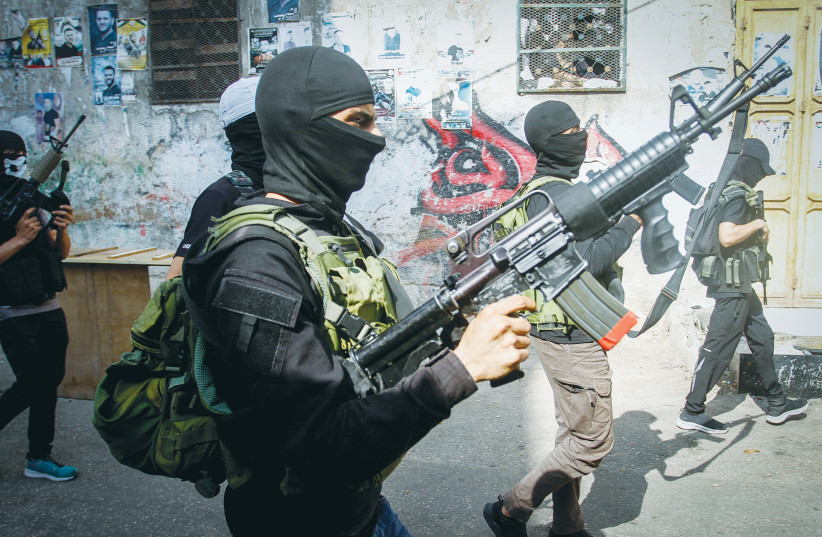The Palestinian Authority is looking to send security forces to “enforce law and order in Jenin,” according to a Palestinian official quoted by Jerusalem Post reporter Khaled Abu Toameh.
A different report at Axios noted that “the Palestinians agreed to start implementing the security plan put forward by the US security coordinator Lt. Gen. Michael Fenzel to restore Palestinian Authority control in the West Bank cities of Jenin and Nablus.”
This is an important initiative. If it actually happens – depending on how robust and long-term it is – it could be a key moment for American support of the Palestinian security forces. According to reports, this is part of a wider discussion between the US, Israel, the Palestinians and the UN Security Council.
Gun violence
The status of security in the West Bank depends on the PA’s ability to reduce gun violence and the rise of armed groups that have plagued the area for the past year.
Focusing on the illegal weapons trade in the West Bank is one way to stem the violence. This likely requires more coordination with Israel and prioritizing the issue.

Over the past year, young men gained access to weapons, particularly M-16s. They have been affiliated with either Islamic Jihad, the Lions’ Den or were working alone.
The presence of so many armed groups, from different factions of Palestinian movements, shows how great the challenge is to the PA – gaining control over scattered groups, a growing generation of armed men linked to Hamas, Islamic Jihad and Fatah.
This is a generation removed from the experiences of the Second Intifada, with only very young memories of the last Palestinian parliamentary elections in 2006. They were only children when Hamas ejected Fatah from Gaza.
The past year has been one of the most deadly in the West Bank, with Israeli security forces clashing nearly every night with armed groups. Israel has preferred to focus its fighting on Islamic Jihad, since the targeting of Baha Abu al-Ata in Gaza in November 2019 as part of Operation Black Belt. Those tensions involved airstrikes in Syria, one of which targeted the home of Islamic Jihad deputy leader Akram al-Ajouri, which led to Russian condemnation.
Nowadays, the daily clashes with Islamic Jihad are harming civilian life. The presence of large numbers of armed men and illegal weapons is a key feature of the threat to security.
When The Jerusalem Post reported on this in late November, an IDF crackdown had just taken place on weapons smuggling, reportedly after a 300% rise in the price of ammunition. An M-16, traded illegally, cost $30,000-$40,000. Despite the high cost, Palestinian teenagers were posing with these weapons on social media.
This showed that the weapons trade was flourishing. They didn’t seem to run into any issues getting ahold of the guns, even though the guns supposedly cost far more than a year’s salary. Where and how the guns were obtained by them is unclear – and the lack of PA security forces made the presence of the guns only rise.
The PA forces don’t appear to have the same type of weapons or accessories for their rifles as the young gunmen, which is a problem for any force hoping to secure Jenin or Nablus. That even Jericho, a key stronghold for the PA security forces, has become a refuge for gunmen, is a major challenge to Ramallah.
The security forces have been receiving training for almost two decades with American support as well as from the EU. If these cities can’t be controlled by the PA’s security forces, it could pose grave questions about their ability to respond to any further security challenges.
One has only to look at other examples around the world of Western-backed forces: the collapse of Kabul in 2020 or the failure of the Iraqi security forces in 2014. These show how stagnation of leadership and complacency can lead to chaos and ruin.
The PA has already faced this scenario – in Gaza in 2006. But back then, it came on the footsteps of the Second Intifada, which changed the landscape. Today, the question is why is the PA, after a decade and half of such robust Western backing and training, failing to control its key cities? And if it loses more control over them, what will happen then?
Its aging leadership is also a challenge for continuity and stability. If it is humiliated in its attempts to regain control of Jenin or Nablus, that would not bode well for the future. At the center of this is the movement of illegal weapons.
Security coordination with Israel remains necessary because the weapons are smuggled across borders that Israel controls.
The PA doesn’t make its own firearms. PA forces carry AK-47s, meaning that the M-16s are not being taken from the PA; they are coming from beyond the PA’s jurisdiction.
Some claim that it’s not whole weapons that are being smuggled in, but rather parts that are then put together. Perhaps this is true in some cases. Yet analyses of the photos and experts’ opinions assert that, for the most part, this is not the case: The serial numbers and manufacturer are listed on them, and an authority wanting to trace them could do so.
The question is whether the attempt to secure Jenin and Nablus will be a symbolic gesture, involve backroom deals with the gunmen to be less visible, or whether it will be a real confrontation with the setting of a new course. This would require a crackdown on illegal weapons and gun violence.
If teenagers and young men continue to have easy access to M-16s and other firearms, the violence and instability will likely return. If it does, it will be only a matter of time before more clashes occur.
